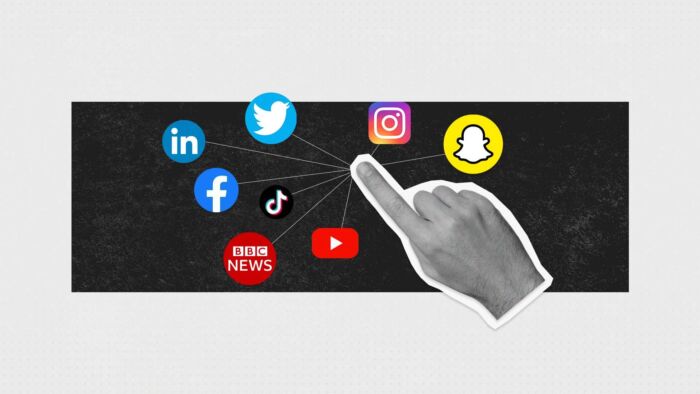As brands seek to create a unified and seamless customer experience across multiple channels, influencers have emerged as an invaluable tool within omnichannel marketing. A dynamic synergy exists between omnichannel and influencer, which blends real-world experiences with social media and other online channels, we call it omnichannel influencer marketing.
Contents
Omnichannel influencer marketing and how it works
4 ways influencers can support omnichannel influencer marketing
Influencer marketing supports other channels as well
Brands getting omnichannel influencer marketing right
How will omnichannel influencer marketing evolve in 2024?

Omnichannel marketing in 2024
Omnichannel marketing refers to a customer-focused strategy that ensures a seamless experience across all channels, whether online or offline. Omnichannel marketing is used to maintain a unified brand identity, which enables customers to switch effortlessly between platforms. While themes are required to be kept consistent across each channel, the strategy should be adapted to suit each channel. Omnichannel is all about providing customers with a consistent experience. That way, as they engage with your brand, they’re having a unified journey.
In 2024, we’re starting to see more brands personalize their omnichannel marketing campaigns even more – using influencers. Influencer marketing is really having its moment right now, following off the back of Amazon’s influencer-led shoppable ads announcement – in partnership with Goat. Influencer as a channel is being integrated with broader marketing channels outside of just social, which means they’re a valuable tool for brands looking at developing omnichannel marketing strategies.
Omnichannel vs multichannel marketing
Omnichannel marketing is often confused with multichannel marketing, when both approaches differ in the way they engage customers.
Multichannel involves using various marketing channels (e.g., social media, email marketing, OOH) to reach customers separately, often with varying messages. Omnichannel marketing seamlessly integrates all channels to create a unified customer experience. Omnichannel features the same message, and prioritizes customer-centricity and cohesion, where multichannel may lack consistency and coordination.
Omnichannel influencer marketing and how it works
In the world of evolving retail, the lines between online and offline shopping continue to blur, which has enabled influencer marketing to take a considerable foothold in the sphere of omnichannel marketing. For brands, harnessing the persuasive power of influencers has provided an opportunity to bridge the gap between online and offline channels, delivering a consistent brand experience both on and off the social feed. For example, TikToker Khaby Lame became the face of Hugo Boss in 2022, and while this partnership would’ve been perfectly placed within the confines of TikTok, the men’s fashion label place plastered Lame across its OOH and website activity, as well as on social, to promote the brand x influencer product collab.
4 ways influencers can support omnichannel marketing
Looking ahead to 2025 we expect to see influencers play a more significant role in supporting omnichannel marketing. Before that, let’s establish just how influencers can contribute to omnichannel:
- Why Influencer takeovers are great for omnichannel marketing
Influencer takeovers are excellent for omnichannel marketing because they enable influencers to temporarily manage a brand’s multiple channels, creating unified and engaging content. This approach aligns with the brand’s message, reaches a broader audience, and provides a seamless customer experience, bridging the gap between online and offline interactions.
- Why live collaborations are great for omnichannel marketing
Live collaborations with influencers enhance a brand’s omnichannel marketing by creating real-time engagement across various channels. These interactions foster immediacy, authenticity, and viewer participation, resulting in a unified and memorable customer experience. Live events bridge the gap between online and offline touchpoints, strengthening the brand’s overall marketing strategy.
Both Sephora and Nike are frequent adopters of live collaborations to support omnichannel marketing. Nike often partners with creators to deliver live workout sessions, which are used to engage users across social channels and the Nike Training Club app. Similarly, Sephora frequently partners with beauty influencers to host live streaming events. These streams are broadcasted on the brand’s website, social channels, and even in physical stores.
- Why pop-up shop collaborations are great for omnichannel marketing
Influencers draw their online followers to the physical store, enhancing foot traffic and sales. Simultaneously, they document the in-store experience on social media, connecting with their online audience and promoting the brand. This bridge between the digital and physical realms creates a unified customer journey, reinforcing brand identity, and expanding the brand’s reach effectively. Influencer-driven pop-up stores provide a dynamic and memorable omnichannel experience.
- Why Influencer ambassador programs are great for omnichannel marketing
Influencer ambassador programs offer a robust omnichannel marketing approach by placing influencers as brand advocates. These ambassadors maintain a consistent brand message across multiple platforms, from social media to in-store appearances. Their ongoing support fosters trust and loyalty among their dedicated followers, contributing to the brand’s image and outreach. This integrated approach ensures a unified customer experience, aligning with the brand’s values and identity, and facilitates a seamless transition between online and offline channels, ultimately strengthening brand presence and engagement.
Influencer marketing supports other channels as well
Influencers have become a prominent force in modern marketing, and they can support a wide array of marketing channels, going beyond just omnichannel marketing. Outside of social media, influencers are valuable assets for a range of different marketing channels.
Email marketing, powered by influencers
Influencers can collaborate with brands on email campaigns. They may provide exclusive content, product recommendations, or co-author newsletters, thereby helping to expand the brand’s email list and increase open rates. This collaborative approach can be particularly effective in reaching a more engaged and interested audience.
Using influencers to support SEO
Yes, that’s right, you can use influencers to boost your SEO performance. When influencers collaborate with brands, they often generate content that resonates with their audience and aligns with a brand’s SEO strategy. Influencer content may include blog posts, videos, and social media posts that mention or link to the brand’s website, products, or services, resulting in valuable inbound links. This boost in link authority and content relevance enhances a brand’s SEO efforts and visibility in search engine results pages.
Leveraging influencer marketing for OOH
Influencers can enhance Out-of-Home (OOH) marketing by connecting the offline and online worlds. They amplify OOH campaigns by sharing photos, endorsements, and personal narratives on social media, extending reach and making the message more relatable. Influencers’ live events and appearances near OOH locations draw attention and engage their followers, and they encourage user-generated content that adds social proof. Collaboration with influencers enables tracking and measurement of the campaign’s impact, as well as content repurposing for online channels. By leveraging influencer presence and creativity, OOH marketing gains a valuable online dimension, enhancing its effectiveness and engagement.
The rise of influencer powered E-commerce
Influencers play a crucial role in supporting e-commerce by driving brand awareness, trust, and sales. They create authentic and relatable content that showcases products or services to their engaged audiences, fostering brand credibility. Their personalized endorsements, reviews, and recommendations resonate with followers, influencing purchasing decisions. Influencers often provide unique discount codes or affiliate links, directly contributing to sales. Additionally, their content is shareable and extends the reach of e-commerce platforms. Collaborations with influencers can also yield valuable user-generated content, enhancing product visibility and social proof. Through influencer marketing, e-commerce businesses can expand their customer base, boost conversions, and strengthen their online presence
Brands getting omnichannel and influencer marketing right
Sephora’s Omnichannel Success with Influencers
Sephora, a global beauty retailer, has successfully woven influencer marketing into its omnichannel strategy, setting a remarkable example. By collaborating with influencers, Sephora ensures that its online presence is both engaging and informative, capturing the attention of beauty enthusiasts worldwide.
However, Sephora’s innovative approach doesn’t stop at the digital realm. It extends to the physical world, where the brand leverages influencers in a variety of ways. Online, customers can use their Beauty Bag accounts to track purchases, scan items while they are in the store, see tutorials, keep a wish list and much more. Offline, the brand experience is consistent with beauty tips, informed salespeople, free makeovers, and, of course, products to try. One notable method involves influencers hosting in-store events and workshops.. These real-world engagements are a strategic move to drive foot traffic to Sephora’s brick-and-mortar locations. Beyond the immediate boost in sales and brand exposure, these events serve to foster a genuine sense of community among beauty enthusiasts. Customers get the opportunity to connect with influencers in person, share their beauty experiences, and learn from the experts, strengthening the bond between Sephora, its influencers, and its loyal customers.
Sephora’s omnichannel approach expertly leverages influencer marketing to create a seamless and cohesive customer experience. This not only enhances its online presence but also bridges the online-offline divide by actively engaging customers and beauty enthusiasts both in the digital space and within its physical stores. Sephora’s integration of influencer marketing truly showcases how a brand can navigate the modern retail landscape successfully.
How will omnichannel influencer marketing evolve in 2025?
As we move towards 2025, the evolution of omnichannel marketing continues to be shaped by the power of influencers.
Influencers are now pivotal in seamlessly connecting online and offline brand experiences. We’ve seen this with Sephora’s successful use of influencers in its wider business use, and how it serves as a prime example of how omnichannel influencer marketing works.
Live collaborations, influencer takeovers, and pop-up shop collaborations are becoming critical strategies for top retailers, enhancing sales and extending the brand reach by promoting online and offline experiences across digital channels.
Influencers have emerged as a versatile and indispensable component of modern marketing, connecting brands with their target audiences across diverse marketing channels. Their impact is poised to continue growing, contributing to a more integrated, engaging, and personalized omnichannel marketing landscape in the years to come.
—
Are you a brand looking to expand reach and explore new digital channels by leveraging influencer talent? Find out how we can elevate your brand using influencer marketing!





